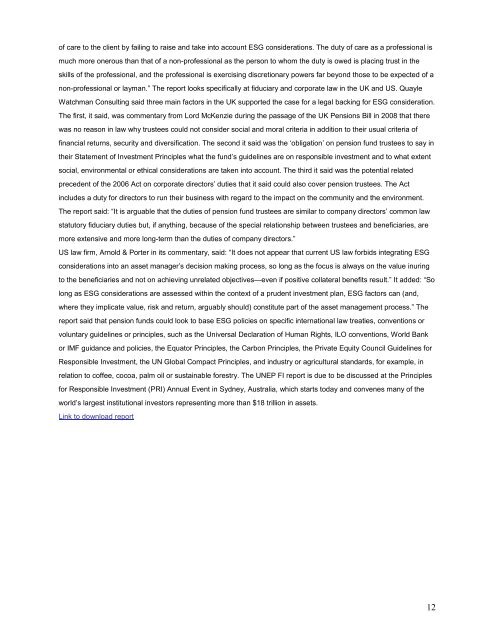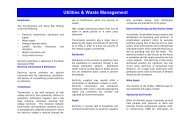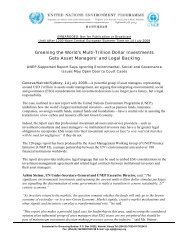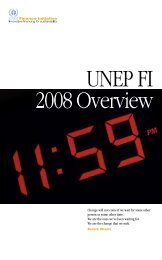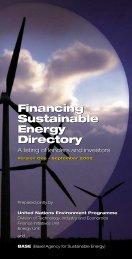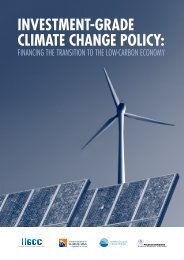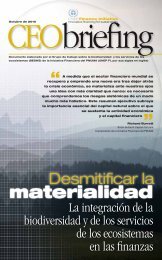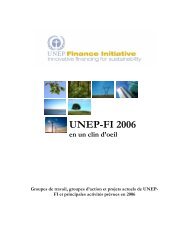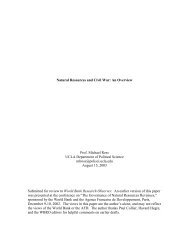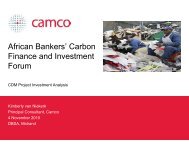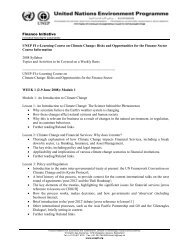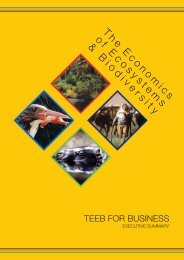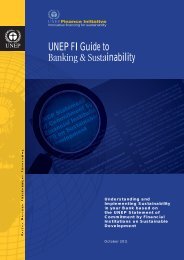UNEP FI Asset Management Working Group The - UNEP Finance ...
UNEP FI Asset Management Working Group The - UNEP Finance ...
UNEP FI Asset Management Working Group The - UNEP Finance ...
Create successful ePaper yourself
Turn your PDF publications into a flip-book with our unique Google optimized e-Paper software.
of care to the client by failing to raise and take into account ESG considerations. <strong>The</strong> duty of care as a professional is<br />
much more onerous than that of a non-professional as the person to whom the duty is owed is placing trust in the<br />
skills of the professional, and the professional is exercising discretionary powers far beyond those to be expected of a<br />
non-professional or layman.” <strong>The</strong> report looks specifically at fiduciary and corporate law in the UK and US. Quayle<br />
Watchman Consulting said three main factors in the UK supported the case for a legal backing for ESG consideration.<br />
<strong>The</strong> first, it said, was commentary from Lord McKenzie during the passage of the UK Pensions Bill in 2008 that there<br />
was no reason in law why trustees could not consider social and moral criteria in addition to their usual criteria of<br />
financial returns, security and diversification. <strong>The</strong> second it said was the ‘obligation’ on pension fund trustees to say in<br />
their Statement of Investment Principles what the fund’s guidelines are on responsible investment and to what extent<br />
social, environmental or ethical considerations are taken into account. <strong>The</strong> third it said was the potential related<br />
precedent of the 2006 Act on corporate directors’ duties that it said could also cover pension trustees. <strong>The</strong> Act<br />
includes a duty for directors to run their business with regard to the impact on the community and the environment.<br />
<strong>The</strong> report said: “It is arguable that the duties of pension fund trustees are similar to company directors’ common law<br />
statutory fiduciary duties but, if anything, because of the special relationship between trustees and beneficiaries, are<br />
more extensive and more long-term than the duties of company directors.”<br />
US law firm, Arnold & Porter in its commentary, said: “It does not appear that current US law forbids integrating ESG<br />
considerations into an asset manager’s decision making process, so long as the focus is always on the value inuring<br />
to the beneficiaries and not on achieving unrelated objectives—even if positive collateral benefits result.” It added: “So<br />
long as ESG considerations are assessed within the context of a prudent investment plan, ESG factors can (and,<br />
where they implicate value, risk and return, arguably should) constitute part of the asset management process.” <strong>The</strong><br />
report said that pension funds could look to base ESG policies on specific international law treaties, conventions or<br />
voluntary guidelines or principles, such as the Universal Declaration of Human Rights, ILO conventions, World Bank<br />
or IMF guidance and policies, the Equator Principles, the Carbon Principles, the Private Equity Council Guidelines for<br />
Responsible Investment, the UN Global Compact Principles, and industry or agricultural standards, for example, in<br />
relation to coffee, cocoa, palm oil or sustainable forestry. <strong>The</strong> <strong>UNEP</strong> <strong>FI</strong> report is due to be discussed at the Principles<br />
for Responsible Investment (PRI) Annual Event in Sydney, Australia, which starts today and convenes many of the<br />
world’s largest institutional investors representing more than $18 trillion in assets.<br />
Link to download report<br />
12


